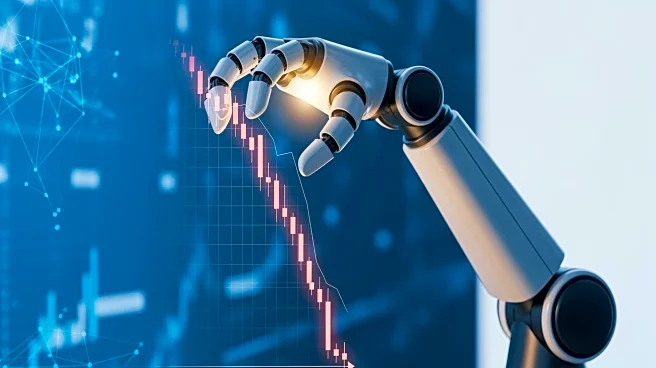What's Happening?
SoftBank Group, a major player in the AI investment sector, has experienced a significant decline in its stock value, with shares dropping by 6.87% on Friday. This decline follows a broader downturn in AI-related stocks, as investors grow increasingly
cautious about the high valuations within the sector. The company, which has a diverse portfolio of AI investments, including infrastructure, semiconductor, and application companies, saw its market capitalization decrease by nearly $50 billion this week. This marks SoftBank's worst weekly loss since March 2020, with shares down almost 20%. The decline comes after a brief recovery, where shares rose nearly 3% following a 10% drop on Wednesday. Analysts attribute the fall to investor concerns over the speculative nature of AI investments and the uncertainty surrounding OpenAI's partnerships and funding prospects.
Why It's Important?
The decline in SoftBank's stock highlights the volatility and speculative nature of the AI investment sector. As a major investor in AI technologies, SoftBank's performance is often seen as a barometer for the industry's health. The significant losses underscore the risks associated with high valuations and the potential for rapid market corrections. This situation could lead to a reevaluation of investment strategies within the AI sector, affecting both large institutional investors and smaller stakeholders. The uncertainty surrounding OpenAI's funding and partnerships further complicates the landscape, potentially impacting future investments and innovation in AI technologies. The broader implications for the U.S. economy include potential shifts in investment focus and a reassessment of the viability of AI-driven business models.
What's Next?
Moving forward, stakeholders in the AI sector may need to adopt more cautious investment strategies, focusing on sustainable growth and confirmed partnerships rather than speculative ventures. OpenAI's discussions with the U.S. government regarding federal loan guarantees for chip factory construction could play a crucial role in stabilizing the sector. If successful, such government support could provide a much-needed boost to AI infrastructure development, potentially offsetting some of the current market volatility. Investors and companies will likely monitor these developments closely, as they could influence future funding opportunities and the overall trajectory of AI technology advancements.


















